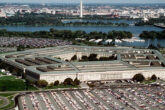June 07, 2018
Congress Should Oversee America’s Wars, Not Just Authorize Them
Nearly 17 years after the 9/11 attacks, a bipartisan coalition of senators has put forward legislation that promises to overhaul the legal framework for America’s worldwide campaign against terrorism. Proponents of this measure argue the existing authorization for military force—an AUMF in wonk-speak—passed back in September 2001 has become woefully outdated. The failure to modernize it, supporters say, represents a dereliction of duty by Congress.
They have a point. The text of the 2001 AUMF no longer bears much resemblance to the wars we are fighting and that we will continue to fight for the foreseeable future. As a matter of both constitutional good practice and common sense, the case for an updated statute is clear.
The problem is that, while a new authorization is legally desirable, its real-world impact is likely to be minimal—doing little more than sanctioning military operations the executive branch is already prosecuting. Lawmakers who portray passage of an AUMF as the ultimate fulfillment of their war-powers responsibilities therefore risk elevating constitutional form over national security substance—while neglecting the far more powerful but less formal tools Congress possesses to influence America’s post-9/11 wars for the better.
That is unfortunate because the need for thoughtful, energetic congressional activism has never been greater. From Afghanistan to Syria to the Sahel, multiple complex U.S. military operations are unfolding . Members of Congress are uniquely positioned to scrutinize these efforts and the strategy underlying them, identify any flaws and failures in policy, and inject innovative or disruptive new ideas into the public debate that will make success more likely.
In the mid-2000s, for instance, it was Members of Congress from both parties who were pivotal in challenging—and eventually overhauling—the Bush administration’s strategy in Iraq.
Read the Full Article at Lawfare
More from CNAS
-
Lessons in Learning
Executive Summary Although claims of a revolution in military affairs may be overhyped, the potential for artificial intelligence (AI) and autonomy to change warfare is growin...
By Josh Wallin
-
The Pentagon Push to Change an “Antiquated” System
Carlton Haelig, a fellow at the Center for a New American Security, joined The Cipher Brief to discuss the systems in place in the Department of Defense and the challenges ass...
By Carlton Haelig
-
The Department of Defense’s Breakthrough Nuclear Moment Risks Slipping Away
Unless they act, the Department of Defense’s breakthrough nuclear moment may vanish before it really happens....
By Will Rogers
-
DEFAERO Strategy Series [Apr 09, 25] CNAS' Becca Wasser and Phil Sheers on Revitalizing the U.S. Defense Industrial Base
On this episode of the Defense & Aerospace Report Strategy Series, sponsored by General Atomics Aeronautical Systems, Becca Wasser and Phil Sheers of the Center for a New Amer...
By Becca Wasser & Philip Sheers




